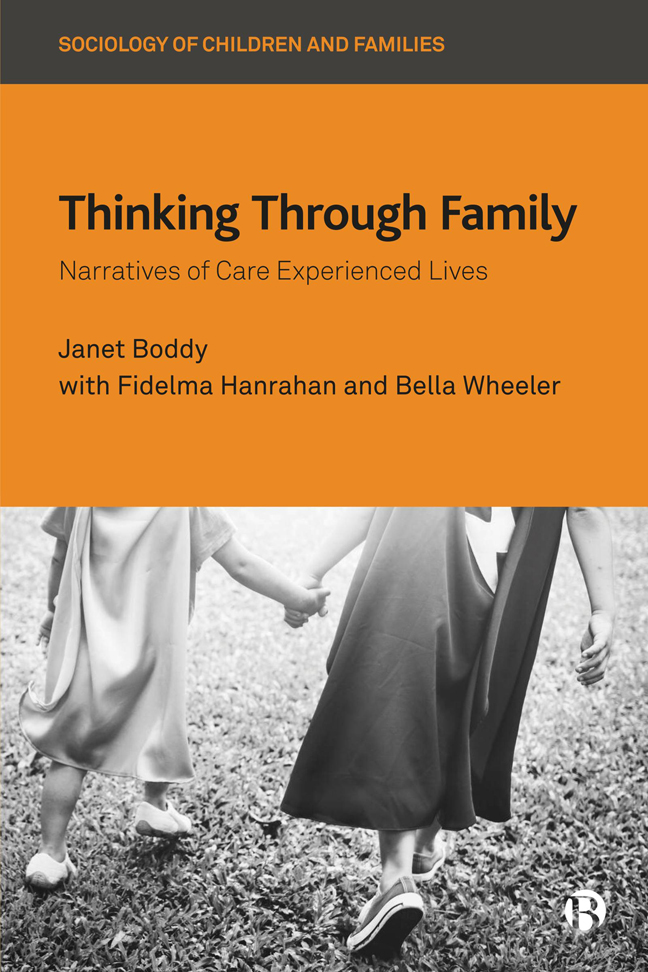Book contents
- Frontmatter
- Sensitive Content in this Book
- Dedication
- Miscellaneous Frontmatter
- Contents
- List of Figures and Table
- Acknowledgements
- 1 Why Think Through ‘Family’?
- 2 Learning From Care Experienced Perspectives
- 3 Doing Family: The Significance of the ‘Ordinary’
- 4 Re/Configuring Boundaries: Who Counts as ‘Family’?
- 5 ‘How Can We Not Talk about Family When Family's All That We’ve Got?’: Care and Connectedness
- 6 Understandings and Experiences of Parenthood
- 7 Thinking Through Family: Implications for Theory and Practice
- Notes
- References
- Index
5 - ‘How Can We Not Talk about Family When Family's All That We’ve Got?’: Care and Connectedness
Published online by Cambridge University Press: 24 January 2024
- Frontmatter
- Sensitive Content in this Book
- Dedication
- Miscellaneous Frontmatter
- Contents
- List of Figures and Table
- Acknowledgements
- 1 Why Think Through ‘Family’?
- 2 Learning From Care Experienced Perspectives
- 3 Doing Family: The Significance of the ‘Ordinary’
- 4 Re/Configuring Boundaries: Who Counts as ‘Family’?
- 5 ‘How Can We Not Talk about Family When Family's All That We’ve Got?’: Care and Connectedness
- 6 Understandings and Experiences of Parenthood
- 7 Thinking Through Family: Implications for Theory and Practice
- Notes
- References
- Index
Summary
Now Leon has a good system. It took him a few weeks to get it just right but now he could tell anyone what to do to look after a baby in the mornings. Change the nappy (remember to use the white cream or by the second morning the baby's bum is sore). Feed the baby but be careful going downstairs because babies move around in your arms and sometimes they’re heavy; if you haven't made the breakfast bottle quickly enough, the baby will start crying again. Put six scoops of baby milk powder in the bottle and fill it with warm water from the kettle. You better taste it to see if it's not too hot. Sometimes if the baby is really hungry, you have to mix in some extra powder and a spoon of sugar. The worst thing is when the baby is sick. That makes a lot of mess and it can take ages to tidy up.
Kit De Waal, My Name is Leon, 2016, p 22Introduction
We are inherently interdependent beings, reliant on other bodies and networks of support, as Butler (2016, p 16) reminds us: ‘Part of what a body is … is its dependency on other bodies and networks of support’. Participants in both studies gave accounts of family practices of care within and across generations. This chapter draws on these accounts to think about the sharpened significance of family connections for care experienced people, focusing in particular on caring responsibilities.
Thirty years ago, Finch and Mason (1993) observed that the responsibilities attached to adult kin relationships have not been legally defined in Britain since the Poor Law system was formally abolished in 1948. And yet, they noted, social policy continues to assume ‘that the strength of family ties, and the sense of responsibility which they incorporate, will be sufficient in most cases to ensure that people's needs are met’ (Finch and Mason, 1993, p 9). Since Finch and Mason published this study, a long period of political austerity has changed the shape of the welfare state in England.
- Type
- Chapter
- Information
- Thinking through FamilyNarratives of Care Experienced Lives, pp. 95 - 119Publisher: Bristol University PressPrint publication year: 2023

